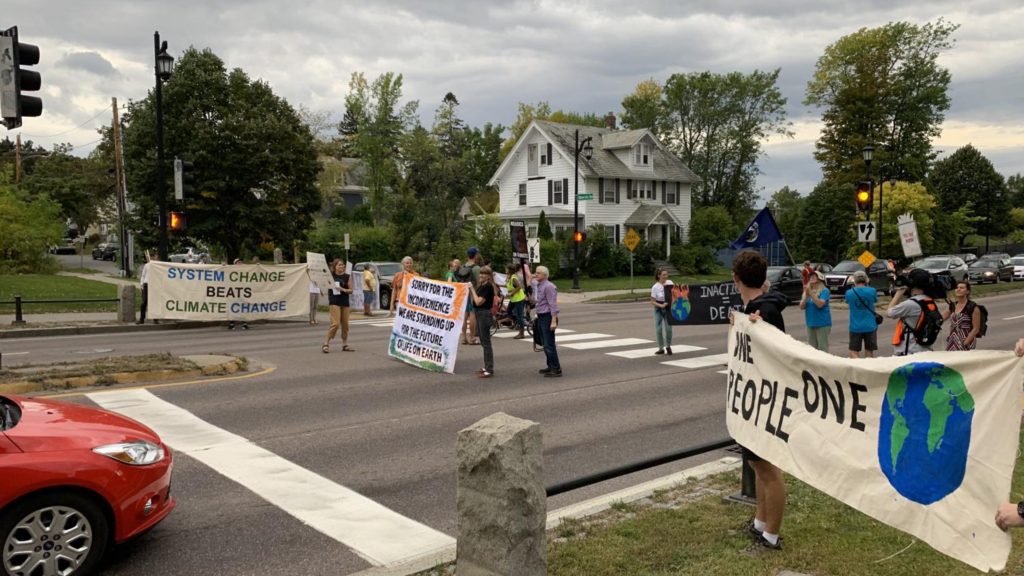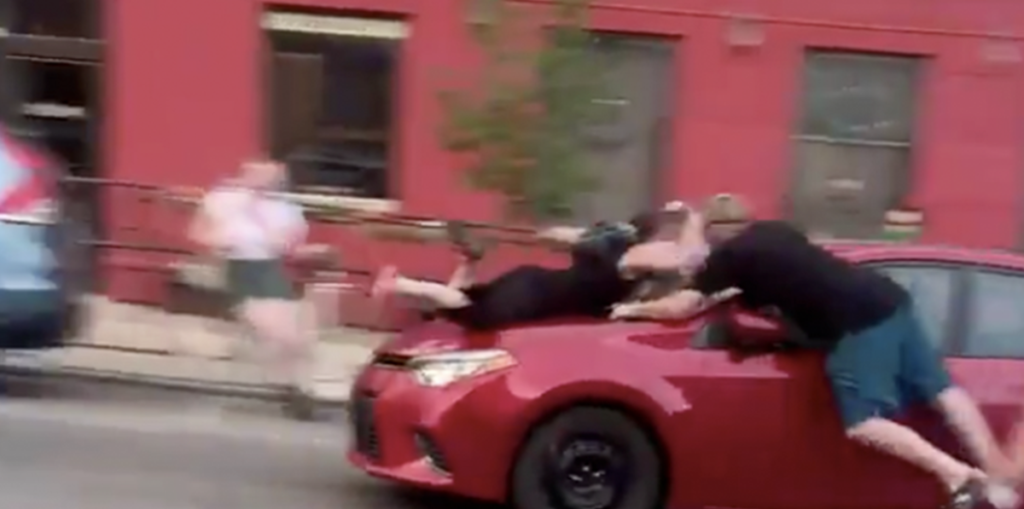https://www.latimes.com/california/story/2019-12-04/sinkhole-settlement
The First Amendment gives people the right to peaceably assemble and to petition the government. Blocking roadways and shouting threats and obscenities are not examples of peaceful behavior. The First Amendment specifies such protests are for the purpose of seeking government redress of their grievances. Is there any indication that the drivers of the jeep and the red car (pictured above) are representatives of government?
Congress shall make no law respecting an establishment of religion, or prohibiting the free exercise thereof; or abridging the freedom of speech, or of the press; or the right of the people peaceably to assemble, and to petition the government for a redress of grievances.
1st Amendment , U.S. Constitution
Here’s the deal. Call the cops and they don’t come. The cops aren’t liable when bad things happen. The Supreme Court has ruled that the cops owe no duty to individuals. Hold that thought.
You are driving your Prius down the street. You are so pleased that you are saving the planet, you fail to see the sink hole in the street. The result, the planet eats your Prius. What happens now? Cha-Ching! The City of LA paid out $4 million to a woman who drove her car into a sinkhole.
I’m just a broke down old cop. I don’t have a law degree and didn’t stay at a Holiday Inn Express last night. I have questions about the two scenarios. Who do I turn to? I guess I could try.

The cops are in the business of protecting people. If they fail to protect an individual, oh well, tough shit! The Department of Public Works has a obligation to maintain streets. If an individual trips on a sidewalk, or falls in a sinkhole, Public Works and the city are liable. Huh?
So what? Catch-22. The cops have no obligation to protect you. On the other hand, the City has an obligation to maintain safe roads. Failure to keep an idiot out of a BFH cost LA $4 million dollars. The cops and the city decide to let the rioters close a road, they have an obligation to the public to erect barricades.
A sinkhole is an immovable hole that appears without warning. It may remain undiscovered until the first inattentive driver falls into it, then the city is liable. A riot is different. With a riot, rioters have to advertise to get people to appear at a specific location at a specific time. There are logistics, gathering bottles and gasoline, debris suitable for barricades, skateboards to beat people about the head and shoulders, shoplifting batteries to power megaphones. All of this takes time. It seems to me sinkhole or riot in the street, the effect is the same. The street is impassible.
Actually, I can think of one significant difference. In the case of a street closed by a riot, somebody at a command level, in the police or city administration made a decision not to enforce the law. That decision is an admission that rioters violating the law have a greater priority than citizens going about their innocent occasions.
Since suing the cops for a civil rights violation seems to be off the table what’s a citizen to do? I know, I know! Let’s go after Public Works for not closing the street. Paving brick thrown through a shop window? Public works, street and sidewalk maintenance. Protesters busted all the streetlights and you got mugged? Public works.
So how does one tell if the barricade in the street is a police barricade or one erected by democrat rioters? I can show examples of typical police barricades.

NYPD Sawhorse 
Steel and wire with interlocking feature 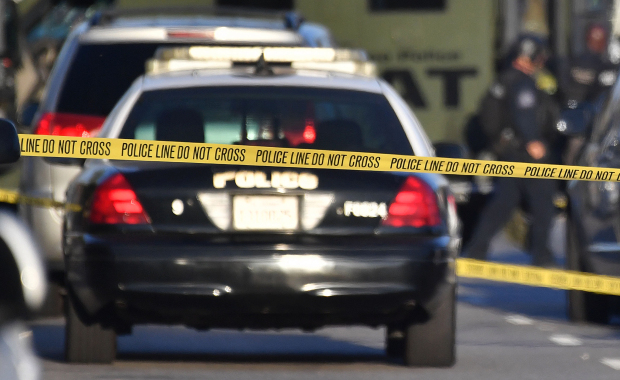
Yellow tape 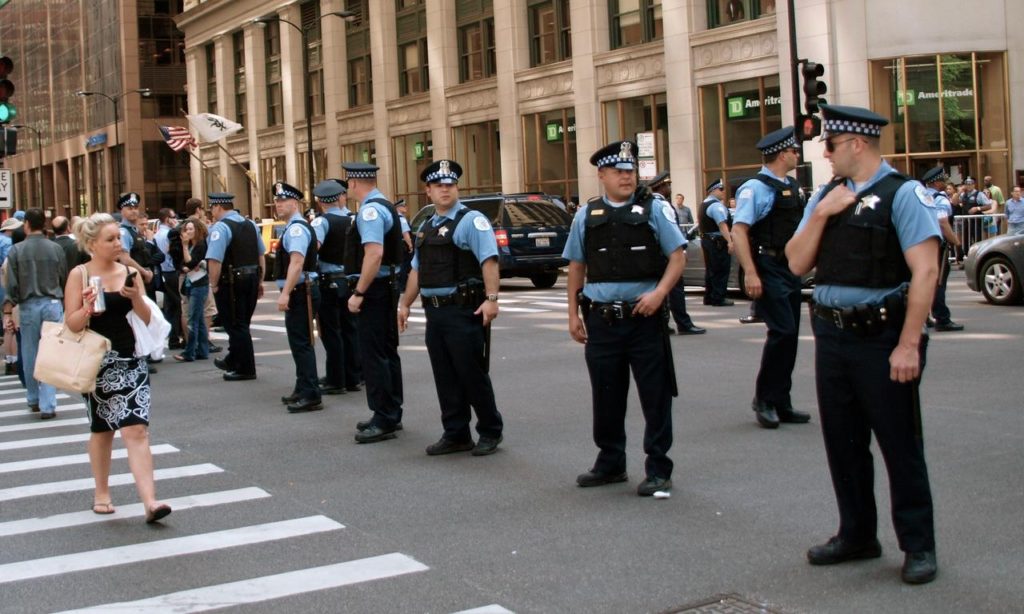
Chicago Cops
Some indications that the barricades ahead were not erected by the police:
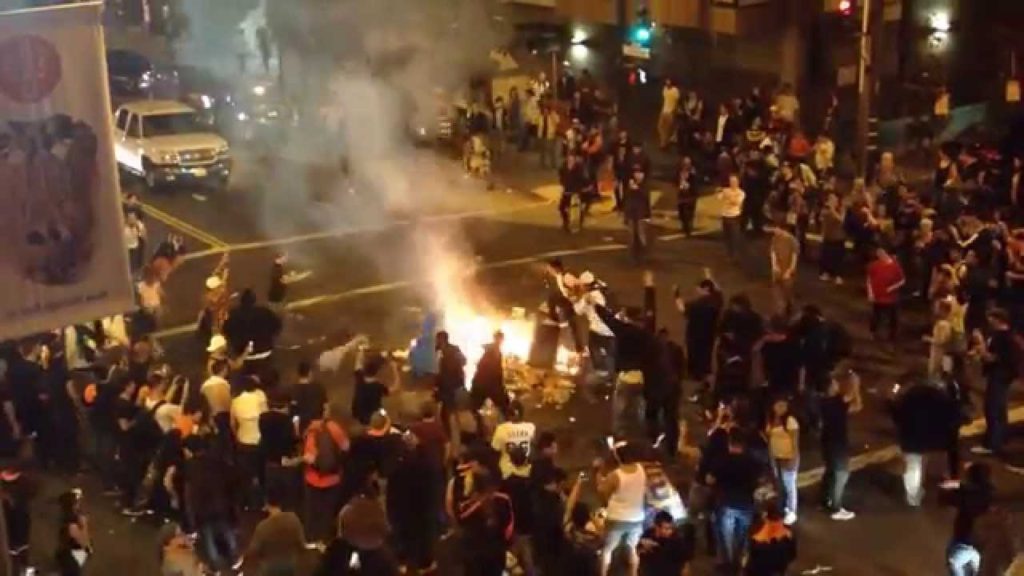
Fire, Cops like flashing lights 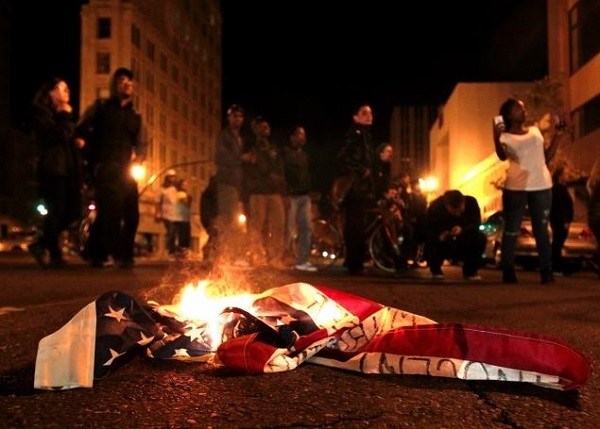
Cops don’t burn the American Flag 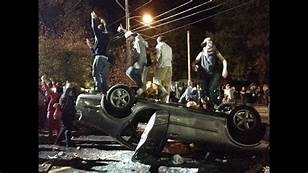
The overturned car may be an indication of what happens, if you don’t stop 
Non standard uniforms
In Texas, is is against the law to obstruct a highway. There is no requirement that the offenders be told to leave the roadway. It is an arrestable misdemeanor.
https://codes.findlaw.com/tx/penal-code/penal-sect-42-03.html
There is this east coast arrogance that seems to believe that the concept of self defense is obsolete. Such things should be left to the cops. At the same time these same folks advocate “Defunding the Police” and are cutting budgets. Now more than ever, effective self defense is vital.
I’m not going to lecture about legal concerns, Andrew Branca is a better source than I am. I am not going to advocate one gun over another, or one school of thought on shooting. One size does not fit all. One thing I will touch on is the concept everybody seems to gloss over. The “reasonable man.”
In order to justify the use of force, at whatever level, one must demonstrate that the action taken was justified. The standard is that given the same circumstances a “reasonable man” would have acted in a similar manner. It doesn’t matter if the “reasonable man” achieved the same outcome.
People bring different experiences, physical ability, handicaps and knowledge when assessing a situation. Reasonableness is going to vary from one person to another. A jury may start out with twelve different assessments of reasonableness. Part of their burden is achieve a consensus in what is reasonable.
It doesn’t matter if, in your defense you bring up specialized knowledge or knowledge of events outside the experience of the audience. The burden is to show that the facts cited are available and don’t represent opinions or conclusions that cannot be duplicated or supported. If the basis of the knowledge can be demonstrated and accepted then the trier of fact can determine the reasonableness of the subsequent action.
When I worked at the narcotics task force I drafted over a thousand search warrants. Not all of them were presented to a judge. I quickly learned that the time frame between not enough probable cause and we have to go NOW, could be quickly overtaken by events.
My solution was to have a running search warrant affidavit. Fox example if “probable cause” was a ten point scale I would start my affidavit with the two points that I possessed. As the investigation progressed, I would add to the affidavit. By the time the boss was jumping up and down demanding a search warrant, I merely had to add the final one or two points to achieve probable cause, rather than beginning at first point. Sometimes the affidavit went into the trash because I never made it to the goal of probable cause. What I advocate is a similar process.
Anybody with kids, has been confronted with the old, “I’m scared, there are monsters under the bed.” The complaint didn’t work then. Absent any supporting facts “I was in fear for my life,” falls in the same category.
How to establish a “reasonable belief?” ANTIFA put out a twitter feed out on how to stop, enter and pull people out of vehicles. The feed supplied helpful tactics and tools to accomplish that task. ANTIFA and BLM rioters have assaulted people with skateboards and bicycle locks. Why those items? Police checkpoints routinely confiscate pipes, wooden closet dowels and 2 x 2’s used to support signs.
Is it reasonable to infer that tactics, tools and behaviors exhibited at BLM and ANTIFA actions are not isolated events but part of tactics shared nation wide?
Up until now nobody has made the observation. If you rode your bike to the protest, why didn’t you lock it. It you didn’t ride your bike why do you need the lock? Or there is no skateboard park here. In Texas, a deadly weapon is dictated by the manner of an objects use. A skateboard or bicycle lock meets the criteria, especially when wielded in a non-traditional manner.
Even though nobody in your community has been assaulted by a skateboard, that doesn’t mean it won’t happen. A citizen confronted by a black clad shit head, armed with a skateboard and uttering threats or profanities is entitled to take the situation at face value.
The lack of police action to protect the public at ANTIFA/BLM roadblocks in Seattle, Portland, Atlanta and Minneapolis may support a reasonable belief that when you are confronted with a similar situation, the cops ain’t coming.
This advice is all background. The base line is that you have a reasonable belief that those folks that engineer the confrontation pose an immediate threat of serious bodily injury or death to you and yours.
As to an obligation to retreat, this is my opinion, based on common sense. So it may not apply in those liberal states that require a retreat. When one is surrounded, retreat is not necessarily backwards, but the path of least resistance.
Common sense isn’t common. The time to plan for a confrontation is when there isn’t one on the horizon. If nothing else, I have tried to point out that a “reasonable fear” is not an individual thing. The “reasonable man” is a legal fiction. The reasonable man flits from one crisis to another. Without realistic preparation there is no guarantee that you will follow.


